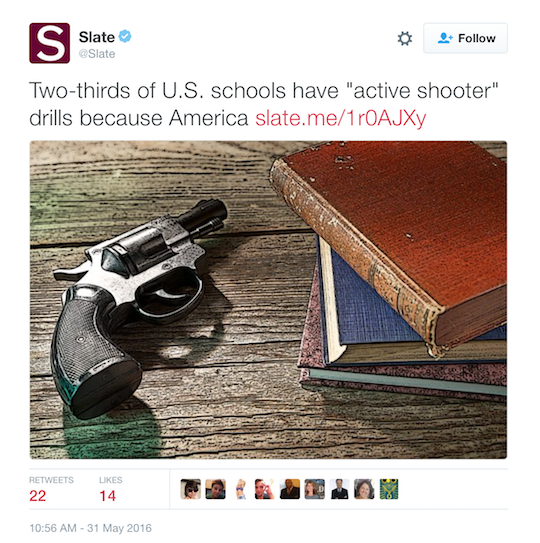Let’s talk about the construction “because [noun]” and how it became the bitter non-joke in this Slate tweet, shall we? Click here for hardcore pornography instead. Okay—the “because [noun]” construction affronts me here for two reasons:
- It substitutes a formula for wit.
- It implies contempt for the noun “America.”
Reason (1) is subjective. I submit that “because [noun]” is not funny anymore, if it ever was. It was pleasing at first as a kind of audacious shorthand. But audacity disappeared with novelty, and now the construction is mainly used to imply wit where none exists. You can’t jump to the moon because gravity. The Senate refuses to confirm Merrick Garland because politics. This baby is smoking because Florida. None of those is clever, but they all convey a certain sardonic attitude, and they all presume the reader knows enough about [noun] to skip the other words.
Which brings us to reason (2). In the sentence “Two-thirds[sic] of U.S. schools have ‘active shooter’ drills because America,” the fraction of schools that practice for mass shootings is the news part. The “because America” construction is the ‘tude. We are to understand that active shooter drills are bad, both by the scare quotes and by it being news that two thirds of schools have them. A two-thirds majority of schools having fire drills isn’t news. And why have the schools come to this sorry pass, where they must practice for mass shootings? Because America.
Bro, that’s unpatriotic. It is true America experiences many more mass shootings than any other developed nation, and that is surely a judgment on our national character. But shit, man, has our contempt become so settled? Am I to read “because America” and smile ruefully, recognizing the byword for morbid hypocrisy? This sentence assumes the reader will read in “America” both the widespread fear of death by shooting and the cynically embarrassed failure to do anything about it.
Anyway, thanks to the magical “because [noun]” construction, Slate can communicate that whole vexed idea with the same smug laziness as a Garfield cartoon. I’m not getting out of bed because Monday. School shootings because America. Nah—school shootings because gun lobby and mental health system. School shootings because us. Whole blog about Slate tweet because personality disorder, but still. We should retire the “because [noun]” construction, lest it tempt us to hack our way through—as we all do from time to time—without considering the occasion.
Willy set me off on that entire jag with this tweet. You should probably follow him.


